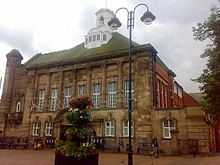Leigh Town Hall

Leigh Town Hall stands facing the parish church across the Civic Square at the junction with Market Street in Leigh, Greater Manchester, England. It was designed for Leigh Borough Council by J.C. Prestwich, who had an architectural practice in the town. Work began in 1904 and the building was opened in 1907. It was granted Grade II Listed status in 1987.[1] Nicholas Pevsner described the building as "An exceptionally good building, expressive yet not showy".[2]
Architecture
The town hall, designed in the Edwardian Baroque style, has two main facades, its main entrance faces the Civic Square and another lined with nine shops faces Market Street. Roughly U shaped in plan, the building is three storeys high with basements and an attic. It is built in Darley Dale sandstone ashlar under a steeply pitched Westmorland green slate roof with a belvedere and ornamental cupola.[1][3]
The three-storey main facade has eight bays of which bays two to eight are symmetrical demarcated by flat pilasters extending from ground level to the roof cornice and from first-floor level, blocked columns with Ionic capitals. The ground floor is solid and plain with an elaborate entrance porch which has paired, blocked columns with Ionic capitals supporting a semi-circular pediment bearing the borough's sculptured coat of arms. The first bay has a glazed door with a pediment above and balcony with a stone balustrade to a first-floor committee room. The balcony is supported on scrolled brackets with acanthus leaves and a carved figure. To the left of the first bay is an octagonal corner turret rising from a carved base surmounted by a dome.[4]
The Market Street elevation is symmetrical with seven bays of which the end bays have gables and oriel windows at first floor level and a round window on the second floor. There is a smaller bow window in the central bay.[1]
Inside is a large entrance hall with scagliola columns and an imperial staircase which accesses the council chamber and mayor's parlour on the first floor.[1] The council chamber has stained glass windows representing some of the town's industries and there are coats of arms on the staircase windows all by H. Gustave Hiller.[2]
References
- ↑ 1.0 1.1 1.2 1.3 Historic England. "Leigh Town Hall (1163007)". National Heritage List for England. Retrieved 12 September 2012.
- ↑ 2.0 2.1 Pevsner 2006, pp. 232–233
- ↑ Town Trail 1, p. 23
- ↑ Town Trail 1, p. 24
Bibliography
- LeighTownTrail Part1 (PDF), Wigan Council, 2000
- Pollard, Richard; Pevsner, Nikolaus; Sharples, Joseph (2006), The Buildings of England: Liverpool and the southwest, New Haven: Yale University Press, ISBN 0300109105